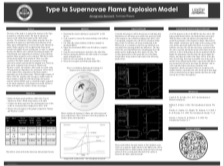Research Symposium
23rd annual Undergraduate Research Symposium, April 6, 2023
Anagrace Bennett Poster Session 2: 1:30 pm - 2:30 pm/ Poster #18

BIO
I am a dual degree in Economics and Finance with a minor in Computer Science. I am a first year here at Florida State. I live in Sarasota, Florida but originally grew up in Ohio.
Type Ia Supernovae Flame Explosion Model
Authors: Anagrace Bennett, Tomasz PlewaStudent Major: Economics and Finance
Mentor: Tomasz Plewa
Mentor's Department: Department of Scientific Computing Mentor's College: College of Arts and Sciences Co-Presenters:
Abstract
The focus of the study is to analyze the structure of the Type Ia supernova explosion model. The Type Ia supernovae focuses on the stellar flame model of this white dwarf structure. The estimations of these flame properties have the potential to be improved, specifically the predictions of the flame speed. Although there is current data on the Supernovae model, further statistics with an approximate flame speed formula will solidify the pre-existing data. In order to compute the data, the MESA code is utilized. By basing the inputs off of fuel density and composition in reference to the explosion problem, flame properties can be analyzed. With these results, a flame speed model can be produced. There is no data currently as the flame models are in progress of being retrieved accurately and checked for marginal error. However, data can be compared to the relevant to Timmes and Woosley’s results. Nevertheless, final results are on the verge of being produced. Regardless, the conclusions will be based on the output of the composition of the flame model’s parameters, given the density input. With the higher density of 6d9 to 1d10, the densities will converge to similar trends. In future studies to build off of this knowledge, this nuclear network with the MESA code is considered simple compared to the actual complexity of the Supernovae model. Efforts to refine and improve the models is always encouraged.
Keywords: Supernovae Computer Programming Research

